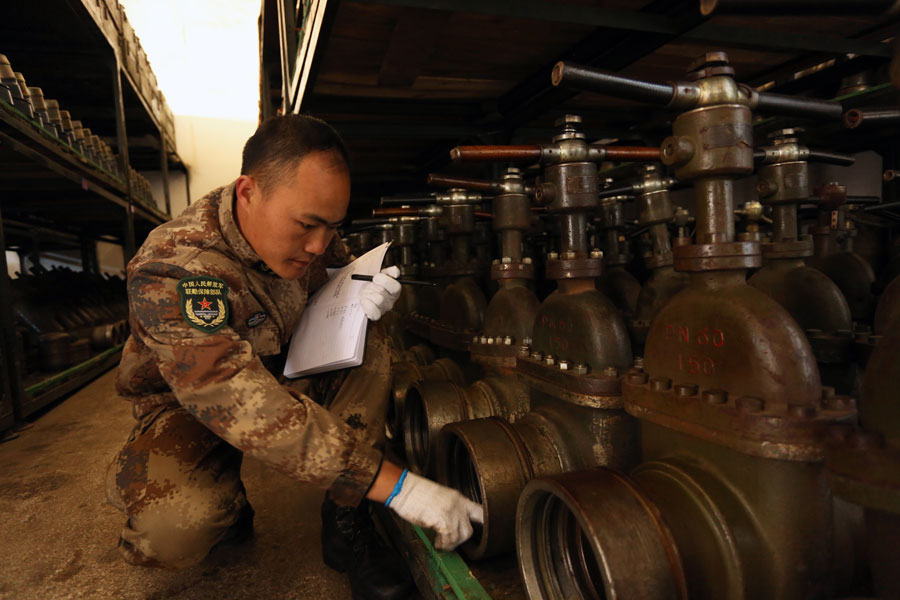
Wu Yong, a soldier in the People's Liberation Army's joint logistic support force, conducts a safety check on oil equipment. [Provided To China Daily]
Unlike many other soldiers who fight with machine guns, jet fighters or missiles, Wu Yong's weapons are normally 6-meter-long steel pipelines.
Wu, 31, is a soldier in the People's Liberation Army's joint logistic support force. Every day in training, Wu and his comrades carry oil pipelines on their shoulders over hills and rivers, connecting them across different terrains in the shortest time. The goal is simple - to make sure the pipelines are seamless to transport liquid fuel.
Humble and rustic as it might sound compared with directly confronting enemies with sophisticated military strategies or solid combat capabilities, Wu is proud of what he does, and what he does is in no way easier than other types of service.
In December 2015, for example, Wu and his comrades went to Tibet for the first time to attend a comprehensive combat drill. They were tasked with ensuring smooth fuel transportation for the exercise and had to set the pipelines in place before the exercise started.
The thin air on the plateau made training with pipelines on his shoulder more difficult. Wu said he clearly felt "short of oxygen, and it was hard to breath". The last day before the exercise kicked off, Wu and his squad were ordered to divert the pipeline route, and while working they came across a river.
"Rivers in Tibet flow from snow mountains, so the water was extremely cold, and also very rapid," said Xiang Haoxuan, a young soldier in Wu's squad.
Having to set the pipes across the river, Wu jumped into the water first without hesitation, followed by his squad. "We felt frozen when we went down into the water. Even though we took turns in the river, I couldn't stand for long, but Wu stayed for about an hour. He was shaking badly after getting on the bank and couldn't utter a word. His face went completely pale and his lips were purple," Xiang said.
That day, Wu and his squad worked from 8 am to midnight and successfully completed the task. Despite the difficulty, Wu and his comrades all found it no big deal.
"We have undertaken so many missions, and we really have to deal with a lot of emergencies," Huang Jinhai, another squad leader who joined the military a year before Wu. "Our training is about flesh versus iron and steel, so bruises, injuries and bone fractures are way too normal," he said, adding that sometimes they feel like "not owning their lives".
Huang still remembers when they were called upon to fix a safety hazard at a leaking oil terminal in 2007. The oil fuel gushed out like water under the scorching heat, and there was a chance the pipe could explode, disseminating toxic gas in the meantime.
Wu, who was young, bold and inexperienced, put on a mask and rushed straight into the terminal. While trying to fix the pipelines, he fainted after breathing in the gas and almost fell into the oil pool.
"I didn't have a good grade in training at the beginning, so I had to work as hard as I could. I didn't want my personal record to make the entire team lag behind," Wu said.
The logistic support force might not receive as much spotlight from the public as their front-line counterparts, but their role is as important as any other in the entire military force, or even more so.
"Many pieces of equipment, jet fighters, tanks and warships all need to be propelled by fuel," said Kang Hui, lieutenant colonel of the pipeline league. "Without it, the fighters can't make it to the sky and the warships can't sail out to the sea. Our job is to make sure the supply is there whenever they need it.
"As we often describe it, fuel is the blood of war, and our pipeline soldiers are the iron and steel veins to transport the blood."
The logistic league Wu belongs to is a force that, in today's peaceful age, still shoulders relatively heavier tasks, covers a wide operational area and very frequently performs non-war military operations.
Wu alone has taken part in 16 major missions, including military operations, disaster relief and comprehensive training exercises during his 13 years of service. He not only specializes in 28 pipeline professions, he is also able to maneuver and repair emergency rescue equipment, pumps, cranes and many other main battle equipment.
According to Kang, the ability to not flinch when facing harsh conditions and fatigue is a basic requirement for pipeline soldiers. It is also compulsory to learn how to "pave paths in mountains and set up bridges across rivers."
"Our pipeline soldiers can't possibly expect to set pipelines on broad smooth roads. They often need to climb over mountains and tread through rivers," Kang said. "That is our commitment to winning."
In July, Wu was awarded the title of "the most admirable serviceman in the new era" by the Publicity Department of the Communist Party of China Central Committee for his dedication to pipelines. He was also the first and only soldier in the entire logistic supply force to earn the honor.
"The honor means more responsibilities. It is not an honor for myself, but to everyone in the logistic support force because they are all devoting themselves rather silently," Wu said. "I will work harder to set that example and encourage all to strive to improve themselves."
Zhang Liang contributed to this story.









